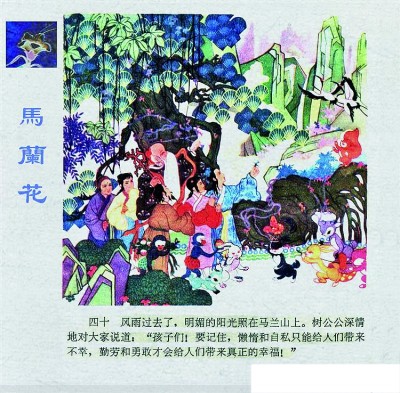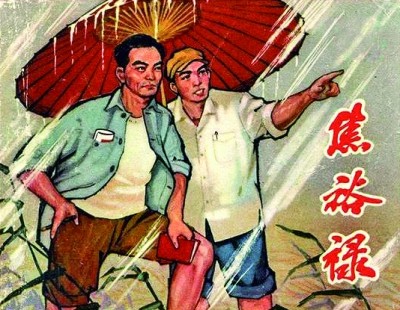Author: Huang Minxue (Associate Professor, School of Arts, Shaoxing University of Arts and Sciences)
In his youth, Jiao Yulu showed his musical talent. In his hometown, the Ya Band of the No. 6 Senior Primary School in Boshan County, Zibo, Shandong Province, he has studied trumpet and erhu, and is especially good at erhu performance. In the eyes of his daughter Jiao Shouyun, “At that time, my father had a literary style. He played the erhu very well, danced well, and was an excellent baritone.”
Jiao Yulu has a special liking for red music. On the march, he led the queue songs such as “Fighting Well”, which was born in the great victory of Laiwu, which made the officers and soldiers of the whole team burst into passion and boosted their morale. He also starred in the red opera “Blood and Tears”, which is as famous as the opera “The White-Haired Girl”, and played the role of Wang Dongcai, the son of a poor peasant.
One night in January 1948, “Blood and Tears” rehearsed by the Huaihe Brigade No. 1 Squadron was performed in Beibiaogang Village, Yanling County, Henan Province. Thousands of people from nearby Shili Baxiang came to watch the show. The plot originated from the dark reality of the Chinese countryside in the old society, and the strong ethnic style that came to the face deeply infected the audience, and the audience was crying and roaring.
Some commentators pointed out that the operas “White Haired Girl” and “Blood and Tears” are popular and influential because they chose a form familiar and easy to accept by the masses, which naturally resonated with Jiao Yulu and the masses. According to Dong Zhaoheng, Jiao Yulu’s comrade-in-arms and former secretary of the county party committee of Mi County, Henan:
The comic strip “Jiao Yulu” Wang Wei et al/edited

The comic strip “Ma Lanhua” Sun Jianlin/painted
At that time, the brigade held a marching bulletin, and the editorial committee asked me to talk to Comrade Jiao Yulu and ask him why he performed the play so well. He said: “I am poor, and the tragic experience of Wang Renhou’s family is my tragic experience. I can’t act, but I can do a play like this without being taught by anyone. Complain about the old society.” He added, “Old Dong, you know this is a very important job for the Party. I’m a Communist, why don’t I do it? Even though I can’t, I can learn it! It is what the party needs me to do, and I have to overcome all difficulties to accomplish it.”
Later, when leading the land reform work in Daying District, Jiao Yulu also organized a literary and artistic propaganda team to guide everyone to rehearse “Blood and Tears”. “The head of Jiao always came to the school from the village with a Huqin to give guidance. He could play, sing, direct, and act as an actor.” (Chen Zhenwang: “Playing Well”) “Blood Tears” Hatred” toured the villages in Daying District, completely turning the situation around in the land reform work.
While working in Pengdian District and Daying District, Jiao Yulu personally taught the local masses and revolutionary cadres to sing revolutionary songs:
One day, he took me to Liu Gengshen’s house and taught me to sing the excerpt “The North Wind Blows” from “The White-Haired Girl”. He patiently taught it line by line, and I studied it carefully, without much effort, and I could sing it completely. From then on, I went to Jiao Yulu to learn how to pull a banhu and sing revolutionary songs. “March of the Volunteers”, “Three Disciplines and Eight Points of Attention” and “March of the Big Sword” were all taught to me by Jiao Yulu. (Zhang Fuwu: “The Versatile Instructor”)
On a sunny and sunny morning, more than 300 teachers and students from the school gathered at the playground, and asked District Chief Jiao to teach and sing the revolutionary song “Playing Well”. This song is divided into four sections, and I still sing it now: (Lyrics slightly). District Chief Jiao said: “The song “Fight Well” plays a huge role in uniting the people, educating the people, disintegrating the enemy, and inspiring the fighting spirit of the army and the people. We must learn to sing this song with revolutionary feelings and class feelings.” The district head first wrote the lyrics on the blackboard, and then began to teach singing. He taught a sentence for the teachers and students to follow along. On the third time, he sang loudly and the teachers and students sang softly. On the fifth time, the teachers and students sang loudly, and the focal district chief sang in a low voice. We learned this song in one class, and the teachers and students were very happy. (Chen Zhenwang: “Playing Well Comes Well Playing”)
In 1950, Zhu Guangyao and Jiao Yulu, officers of the troupe of Caizhuang District, Yuxian County, trained for five months in the Chenliu Special Area dry training class. Many excerpts from “The White-Haired Girl”… I and many students followed him to learn many revolutionary songs such as “March of the Sword”, “Unity is Strength”, “Without the Communist Party, There Would Be No New China”. With the infinite loyalty of the party and the people, he sang the opera “Blood and Tears” with deep hatred of the class and the nation.” (Zhu Guangyao: “Unforgettable Classmate Love”) Jiao Yulu taught Mao Shigong, a security guard of Weixian County Party Secretary Zhao Zhongsan, to sing the excerpt “The North Wind Blows” from “The White Haired Girl”, and also taught him “Three Disciplines and Eight Points of Attention” and “The Internationale” Classic red songs such as “Song of the Sword”, “Guerrilla Song” and “March of the Volunteers” (Mao Shigong: “Jiao Yulu taught me to read and sing”).
In order to do a good job of propaganda and agitation, Jiao Yulu compiled revolutionary principles and the party’s principles and policies into jingles, ballads, allegiance books, etc., to publicize and educate the masses in the language of the masses and in the form of folk, “they have played any role in the Communist Party’s efforts to win the masses and propaganda policies. role that cannot be replaced by other weapons”. (Jiao Shouyun: “My Father Jiao Yulu”) At the inaugural meeting of the People’s Government of Pengdian District, Weishi County, Henan, Jiao Yulu composed his own red ballad:
On the 14th day of the first lunar month, the Pengdian District Office was established. Tell everyone to know that if there is any injustice or revenge, everyone will come to avenge it.
Jiao Yulu established the Baotian team in the local area, using songs to call on the working people to love Chairman Mao and the Communist Party, and actively participate in the struggle for land reform:
Chairman Mao, the Communist Party, leads the people to liberation. Divided the land and food, and wore new clothes. Pushing aside the dark clouds to see the sun, the poor look forward to the Communist Party. Fight the landlord, divide the land, and the poor live a good life.
He also compiled a song called “Song of the Barrel of a Gun” to explain to the masses the revolutionary truth of “power comes from the barrel of a gun”:
The barrel of a gun is a treasure, and revolution is indispensable. Relying on it to seize the seal handle, the bandits will be defeated; the barrel of a gun is a treasure, and you must firmly grasp it. Rely on it to turn over, and the counter-revolutionary will be defeated.
When reporter Feng Jian interviewed Jiao Yulu in his hometown, he was deeply impressed by Jiao Yulu’s literary potential and talent. He said that if he did not engage in politics, he would become an excellent literary and artistic worker. It is precisely under the influence of red music that this young literary and artistic youth who went south with the People’s Liberation Army unreservedly dedicated his outstanding artistic talent to the people in a different way.
There is a detail in the long newsletter “The Role Model of the Secretary of the County Party Committee – Jiao Yulu”: On a snowy day, Jiao Yulu took a few young comrades to the countryside to visit the poor, “walking on the snow, while singing “Southern”. Mud Bay”. According to Xu Zhendong, who has worked with Jiao Yulu for a long time, in addition to singing operas, Jiao Yulu can also sing Erhu, Peking Opera, Lu Opera, Henan Opera and many other operas, and he also has a certain foundation in playing Erhu. When he went to the countryside, he had the “four must-bringers”, and the erhu was one of them. He said: the reason for bringing the erhu is that music is a popular, lively and infectious propaganda and education weapon for the masses; The mood of the comrades enriches the life in the countryside and stimulates the motivation to work; the third is to practice regularly, which can improve the music skills and serve everyone better. He also specially compiled a ballad on the governance of the “three evils”, explaining in an easy-to-understand manner from the meaning and determination to control the “three evils” to the specific methods of sand control, water control, and alkali control. One of the masterpieces in service to the people”.
Jiao Yulu also asked the youth cadres of the county youth league committee to take the lead in learning to sing, “to be full of vigor, not lifeless”, and taught Lankao county militiamen to sing “Three Disciplines and Eight Points of Attention”. He also used his experience of performing red operas in his early years to encourage cadres in Lankao County to let go of their hands and feet and practice bravely:
When I first arrived in Henan, the countryside was preparing to carry out land reform, and the masses were very difficult to mobilize, so I made up a play for propaganda. I have also acted in dramas, I acted in “Blood and Tears”, and in “The White-Haired Girl” I was Yang Bailao. As long as you play the crowd with class feelings, you will cry… so you have to study it! (Ren Yanfang: “Jiao Yulu in My Eyes: Interview Notes from 1965 to 1966”)
Red music is also a vivid material for Jiao Yulu’s ideological education for his children. According to Jiao Shouyun’s recollection:
He took us to watch the children’s drama “Malan Flower”, and also taught us to sing: Malan flower Malan flower is not afraid of wind and rain, hard-working people are talking, please bloom immediately. Take us to the movie “Red Boy”, and sing the theme song “We Are the Successors of Communism” with us (the memory is wrong here, this song is the theme song of the movie “Heroic Little Eight Roads”, the theme song of the movie “Red Boy” It is “Communist Children’s Song”). Teach us to cherish grain, and often take us to sing “I am a grain of rice”: I am a grain of rice, growing in the fields, how easy it is for a farmer to plant me. It was the best time in my memory. It has been decades since my father left us. No matter what position we are in, our six brothers and sisters have worked diligently and honestly. Father’s influence on us has lasted for a long time. (Jiao Shouyun: “My Father Jiao Yulu”)
This year is Jiao Yulu’s 100th birthday. The “Jiao Tong” planted by Jiao Yulu at that time is already a pavilion. The red music that Jiao Yulu performed and taught, together with his spirit, has turned into a never-fading red gene, condensed the majestic power to realize the great dream of national rejuvenation, and ushered in a new era of thousands of hectares of clear greenery.
“Guangming Daily” (August 05, 2022, 16th edition)
[
责编:陈畅 ]
